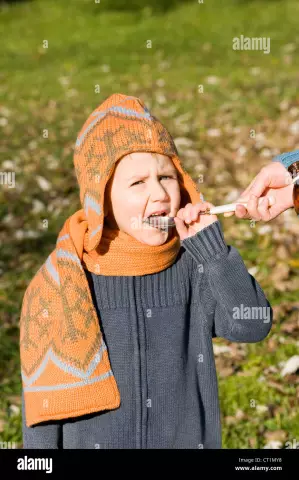- Author Rachel Wainwright wainwright@abchealthonline.com.
- Public 2023-12-15 07:39.
- Last modified 2025-11-02 20:14.
Coughing fit

Cough is an unconditioned reflex, forced exhalation, provoked by the contraction of the muscles of the respiratory tract due to irritation of the receptors for the natural cleansing of the respiratory tract from foreign substances, as well as preventing mechanical obstacles that impede the patency of the airways. Cough is the body's defense mechanism that ensures the preservation and cleansing of the tracheobronchial tree from irritants and foreign bodies. Irritating agents (mucus, blood, sputum, pus), including foreign bodies (food pieces, dust, lint and other airborne elements) can provoke a coughing fit.
A coughing fit is the body's response to the action of the pathogen, manifested by a sudden onset of coughing to eliminate irritation, lasting until complete relief. Cough during seizures is called convulsive or convulsive, since cough jerks do not allow the patient to inhale, following one after the other. In some cases, severe attacks of coughing can result in vomiting, respiratory failure, heart rhythm, fainting. Coughing fits can cause panic in a person. If a coughing attack is single, then in this case, as a rule, there is no cause for concern, since the cause of the attack may be an irritant that suddenly entered the airways. However, if coughing attacks take on a recurrent nature, intensify, then you should pay attention to additional symptoms.
Severe coughing fits are not a disease, they are just symptoms that may indicate a specific disorder or disease.
Coughing attacks as symptoms of diseases
Before proceeding with the treatment or elimination of coughing attacks, it is necessary to determine the symptom of which disease they are. Treatment of the coughing attacks themselves will be ineffective if their cause is not eliminated.
Coughing fits can be symptoms of various types of acute respiratory diseases, diseases of the upper and lower respiratory tract (bronchial asthma, tuberculosis, lung tumor diseases, etc.), viral and bacterial infections, allergies. Coughing fits can develop when irritants and foreign bodies enter the respiratory tract. A cough can signal diseases of the cardiovascular system, nervous system.
There are a number of characteristics used to describe coughing fits. Based on the combinations of these characteristics, it is possible to establish with a high degree of probability which pathological process causes severe coughing attacks.
A cough without sputum is called dry. A dry cough in most cases is a sign of the development of pathologies in organs other than the respiratory system (heart defects, inflammation of the outer ear, diseases of the nervous system, pericarditis). A dry cough is also commonly called unproductive. Except for the elimination of mechanical irritants, dry cough does not fulfill its protective function.
A wet cough is caused only by diseases of the respiratory system. With a wet cough, there is an abundant secretion of sputum due to the increased formation of bronchial secretions. The nature of the secreted sputum is also a sign of a pathological process.
The duration and frequency of coughing characterize persistent and intermittent coughs, single cough urges and severe coughing fits.
Acute and chronic cough is determined by the duration of its existence. So, an acute cough is considered to exist for 3 months, a chronic cough is called a cough with a duration of more than 3 months.
What causes severe coughing attacks?

Conventionally, the factors causing coughing attacks are divided into four groups:
- Inflammatory / allergic factors - bronchial spasms, increased viscosity of sputum, inflammation of the mucous membrane of the respiratory tract, edema, increased production of sputum;
- Mechanical factors - an increase in lymph nodes, the formation of tumors that have a compressive effect on the bronchi and trachea, a foreign body in the ear canal, larynx;
- Thermal factors - irritation of the respiratory tract by excessively cold / hot air;
- Chemical factors - gaseous substances inhaled with the air, drugs, in which coughing fits are a side effect.
What can cause coughing attacks in a child?
Coughing fits in a child should be treated with extreme caution, as in most cases the child is unable to explain his condition and accompanying symptoms. Inflammatory and mechanical factors are the most likely causes of coughing fits in a child. If a child has a coughing fit accompanied by fever, general weakness, rhinitis, lacrimation, sleep disturbance, loss of appetite, then the cough is most likely due to colds. If a child's coughing fits are not accompanied by symptoms of disease, and the cough manifests itself or intensifies only when the child goes to bed, then the coughing fits can be caused by profuse drooling during the teething period. In some cases in a child, coughing fits can be triggered by inhaling a large foreign body while playing, which can result in choking.
If a child has coughing attacks accompanied by the following symptoms, then you should immediately consult a doctor:
- temperature;
- suffocation;
- general weakness, painful appearance of the child;
- an increase in the frequency of breaths;
- pain when coughing.
Adult coughing fits: when to see a doctor
Occasional coughing fits in an adult are usually harmless. However, there are a number of signs that require immediate medical attention:
- Coughing fits in an adult last more than a week, and there is no relief;
- High fever against the background of coughing fits in an adult;
- Asthma attacks are observed;
- General weakness and weight loss;
- The nature of the sputum (content of blood impurities, green, yellow color, density);
- Coughing fits in an adult are accompanied by chest pain.
How to relieve a coughing fit: general recommendations
There are various ways to relieve a coughing fit. Before taking any action, it is necessary to determine what type of cough the patient has. Cough, being a protective reflex of the body, performs an auxiliary function in diseases, eliminating excess mucus and phlegm. The main task in the treatment of cough is not to eliminate it, but to alleviate it. Inhibition of cough is possible only if the cough negatively affects the patient's condition (interferes with sleep, causes vomiting, suffocation).
The main way to relieve a coughing attack is the following medications:
- Expectorants;
- Mucolytic agents;
- Mucoregulatory agents;
- Antitussives.
YouTube video related to the article:
The information is generalized and provided for informational purposes only. At the first sign of illness, see your doctor. Self-medication is hazardous to health!






